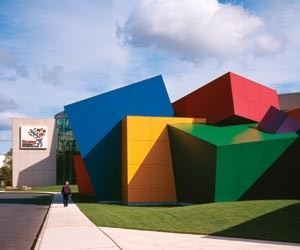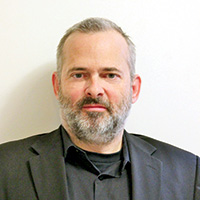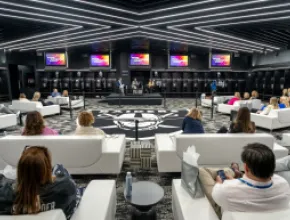Generally credited with giving New York its "Empire" nickname, George Washington would find his epithet today also aptly describes a vast cultural realm. Gotham, naturally, is a world cultural capital, but New York’s empire of enlightenment extends to every corner.
From agriculture and art to winter sports and Woodstock, New York’s cultural campus is among the nation’s most diverse, with curatorial coordinates ranging from the Montauk Lighthouse Museum on Long Island’s easternmost tip to the Adirondack Museum and the Hyde Collection in the state’s northern reaches.
Among hundreds of group-friendly venues, following are eight choice picks from the Empire State’s cultural catalog.
1. Bethel Woods Center for the Arts, Bethel
Located at the original 1969 Woodstock festival site, the Bethel Woods Center for the Arts and accompanying Museum at Bethel Woods enshrine one of America’s most pivotal cultural moments. With venues including the intimate indoor Event Gallery and The Pavilion Stage, accommodating 15,000 guests under cover and outdoors on a natural sloping lawn, center gatherings are uniquely transporting experiences.
"Whether you are a group of 20 or 220, we can accommodate functions ranging from traditional wedding receptions and boardroom meetings to class reunions and conference symposiums," says Darlene Fedun, the center’s chief operating officer. "In addition, Bethel Woods offers the unique opportunity to hold small and large benefit concerts, along with day-long festivals on the 2,000-acre property."
2. Strong National Museum of Play, Rochester
Housing the world’s most comprehensive collection of toys, dolls and other play-related objects, this is a preeminent U.S. destination for kids and adults. Also home to the National Toy Hall of Fame and International Center for the History of Electronic Games, the museum’s exhibits include a rare early version of Monopoly.
"As the only museum in the world devoted solely to the study of play, we offer a truly unique setting for receptions, meetings and other special events," says Debie Himmelsbach, who oversees facility rentals at the museum. "Whether planning a business meeting for 12, a dinner for 25 or a reception for 250, we can provide just the right space, with memorable experiences guaranteed in exploring our dynamic, hands-on exhibits."
3. New York Wine & Culinary Center, Canandaigua
In the heart of upstate’s Finger Lakes region, this welcoming non-profit celebrates the state’s tradition as a leading national farm and wine producer. Spaces include the Taste of New York Restaurant, its outdoor deck overlooking the Canandaigua Lake Pier; the Tasting Room, serving New York beer and wine; and the Wine Spectator Educational Theater, an amphitheater-style setting for cooking and wine classes.
"Our mission is to promote New York State agriculture by using state wine, beer, spirits and food while supporting local growers and producers," says Alicia Thompson, the center’s development coordinator. "Our Hands-On Kitchen is perfect for culinary team building, we host outdoor summer events in our Garden Tent, and our other spaces are ideal for gatherings including seminars, retreats and receptions."
4. Herbert F. Johnson Museum of Art, Ithaca
World-renowned architect I.M. Pei left his mark in Ithaca with this circa-1973 institution, esteemed as one of the nation’s most important university museums. Cutting a dramatic figure on the Cornell University campus, the Johnson, with a superior collection spanning history and the globe, is artful in its own right. Event spaces include the sixth-floor Lynch Conference Room, offering commanding views of Cayuga Lake, and the glass-enclosed Robert and Helen Appel Lobby, accommodating up to 200 guests for receptions. Private tours are available, along with full facility rentals. Since opening in 1973, the Johnson’s permanent collection has more than tripled in size. A three-story extension, along with renovations to the fifth-floor Asian galleries, is scheduled for completion in 2011.
5. Opus 40, Saugerties
In 1938, sculptor Harvey Fite purchased an abandoned bluestone quarry near Saugerties and thereafter began a project that Architectural Digest would later herald as "one of the largest and most beguiling works of art on the entire continent." Over the ensuing 37 years, until his untimely passing in 1976, Fite singlehandedly composed hundreds of thousands of pieces of quarry stone in a spellbinding swirl of ramps, terraces, pools and walls. Estimating that it would take him 40 years to complete, he named his epic undertaking Opus 40. With Overlook Mountain as the backdrop, the six-acre property, which includes Fite’s Quarryman’s Museum, is an enchanted choice for gatherings. Artistic Director Tad Richards—who, as Fite’s stepchild, grew up at Opus 40—says "groups and events of all kinds are welcome."
6. Farmers’ Museum, Cooperstown
Deep-rooted in New York’s agricultural heritage, this pastoral destination is one of America’s premier rural life museums. Part of a still-working farm first owned by legendary local novelist James Fenimore Cooper in 1813, the museum complex, opened in 1944, is ideal for groups of all ages.
"Using its spacious grounds and 20 historic structures, which include a blacksmith shop, a tavern, a print shop and a general store, the museum, blurring the line between exhibition and working farm, educates visitors about farming techniques, traditional crafts and rural life from the 1800s," says Garet Livermore, vice president for education with the Farmers’ Museum and New York State Historical Association.
The museum also showcases The Empire State Carousel, a collection of more than 23,000 artifacts, knowledgeable interpreters and a wealth of farm animals.
7. Lake Placid Olympic Venues, Lake Placid
Few post-Olympic sites have achieved such lasting success as the village of Lake Placid. Home of the 1932 and 1980 Winter Olympic Games, Lake Placid is a model of economic sustainability, converting Olympic assets into year-round use for sports recreation, training and competition. Incorporating Whiteface Mountain and Gore Mountain, the Olympic venues, including the ski jump towers, speed skating oval and famed "Miracle on Ice" hockey rink, are managed by the New York Olympic Regional Development Authority (ORDA), which offers an extensive menu of Olympic-themed activities.
"Groups utilizing our legendary facilities and visiting Lake Placid are in for a treat," says ORDA President and CEO Ted Blazer. "The diversification of our Olympic Village, coupled with the unique offerings available at the facilities and the surrounding region is a lineup that will suit a multitude of tastes and requirements."
8. Culinary Institute of America (CIA), Hyde Park
Founded in 1946 as the New Haven Restaurant Institute, the CIA today is regarded as the world’s premier culinary college. Renamed the Restaurant Institute of Connecticut in 1947 and then The Culinary Institute of America in 1951, the alma mater of Anthony Bourdain, Dean Fearing and some 40,000 other chefs and food industry professionals moved its headquarters to this former Jesuit Seminary on the banks of the Hudson River in 1970. Wine explorations, culinary boot camps and hands-on cooking classes provide a taste of the action. Five award-winning, student-staffed public restaurants, including Escoffier and American Bounty, provide a taste of the food.
"Whether sampling food and wine in our restaurants or witnessing students in training while touring our kitchens and bakeshops, groups have several appealing options at the CIA," says Judy Hannon, food and beverage sales manager.
Fast becoming a New York cultural icon himself—at least in his own mind—regular contributor Jeff Heilman celebrated 24 years in the Empire State this year.







